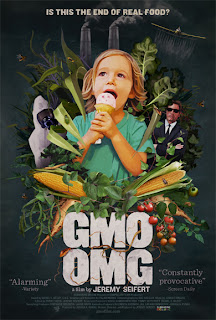Anyway, the premise of the movie is that the director / writer / editor / star Jeremy Seifert, along with his wife, became more concerned about what they were eating once they had children, and were responsible for feeding someone other than themselves. That lead to Seifert’s quest to find answers to certain questions, namely, “What are genetically modified organisms?” and “Are they beneficial or harmful to health?”
One issue often brought up regarding GMOs is that by introducing, say, DNA from a fish into a strawberry, we could be creating a previously unknown-to-humans protein that might provoke an allergic reaction (as with the StarLink corn debacle). This was not a feature of this film. Instead, Seifert focused on the two major types of GMOs: Plants that are modified to produce their own pesticides (aka BT corn) and plants that are modified to be resistant to herbicides (aka Roundup-Ready soybeans).
The film also addresses concerns that GMOs are the latest weapon against nature (i.e. pests), and that weeds, insects and other pests are adapting faster than ever thought possible.
Another central issue is the idea that GMOs are needed in order to “feed the world.” When that question first came up in the film, I sat there thinking, “What about all the food waste in the world?” That question was addressed later, with the little fact that we produce 4,000 calories per person per day. That’s far more than anyone (other than some athletes, perhaps) needs…so why do we need to double production?
The Rodale Institute has done field trials at its farm in Pennsylvania showing that organic yields match conventional yields (by definition, organic farming does not allow for GMOs), and that there is 30 years of data from research by 100s of scientists published via 100s of peer-reviewed scientific journal articles to back that up. As Rodale executive director Coach Mark Smallwood said, the myth that we can’t feed the world through organic agriculture has been disproven. “We can feed the world, and we can feed it well.”
Their is a lack of published, publicly accessible research supporting the ideas that GMOs are harmful or healthful. For that reason, the “precautionary principle” was brought up several times. As former U.S. Representative (Ohio) Dennis Kucinich said: “We do not know the effects of this grand experiment…If we are indeed what we eat, we should know the nature of what we are consuming so we know what we will become.”
And that is why Connecticut and Maine have GMO food labeling laws, and Whole Foods will start requiring labeling on all foods it carries. Labeling efforts have failed in Vermont and California, in part due to the threat of lawsuits by one of the big, deep-pocketed GMO industry players and or slick “vote no” campaigns. We’ll see what happens in Washington this fall.








